Business Law Assignment: Evaluating Contracts for High Five Systems
VerifiedAdded on 2022/12/30
|8
|2591
|96
Report
AI Summary
This report analyzes a business law scenario involving High Five Systems and potential contracts with Jacob, Iris, Hamid, and Ranbir. The assignment examines the application of contract law principles, including offer, acceptance, invitation to treat, and counteroffers, to determine if legally binding agreements were established. The analysis considers the advertisement issued by High Five Systems, the communications between the parties, and whether the elements of a valid contract were present. The report concludes that, despite conversations, no contracts were formed due to issues with offers, acceptances, or counteroffers. The report references relevant case law such as Carlill v Carbolic Smoke Ball Co and Partridge v Crittenden to support its findings. It emphasizes the importance of clear communication and mutual agreement in contract formation and it is submitted by a student for publication on the Desklib platform.

1
Contents
Question...........................................................................................................................................2
Reference List..................................................................................................................................7
Contents
Question...........................................................................................................................................2
Reference List..................................................................................................................................7
Paraphrase This Document
Need a fresh take? Get an instant paraphrase of this document with our AI Paraphraser
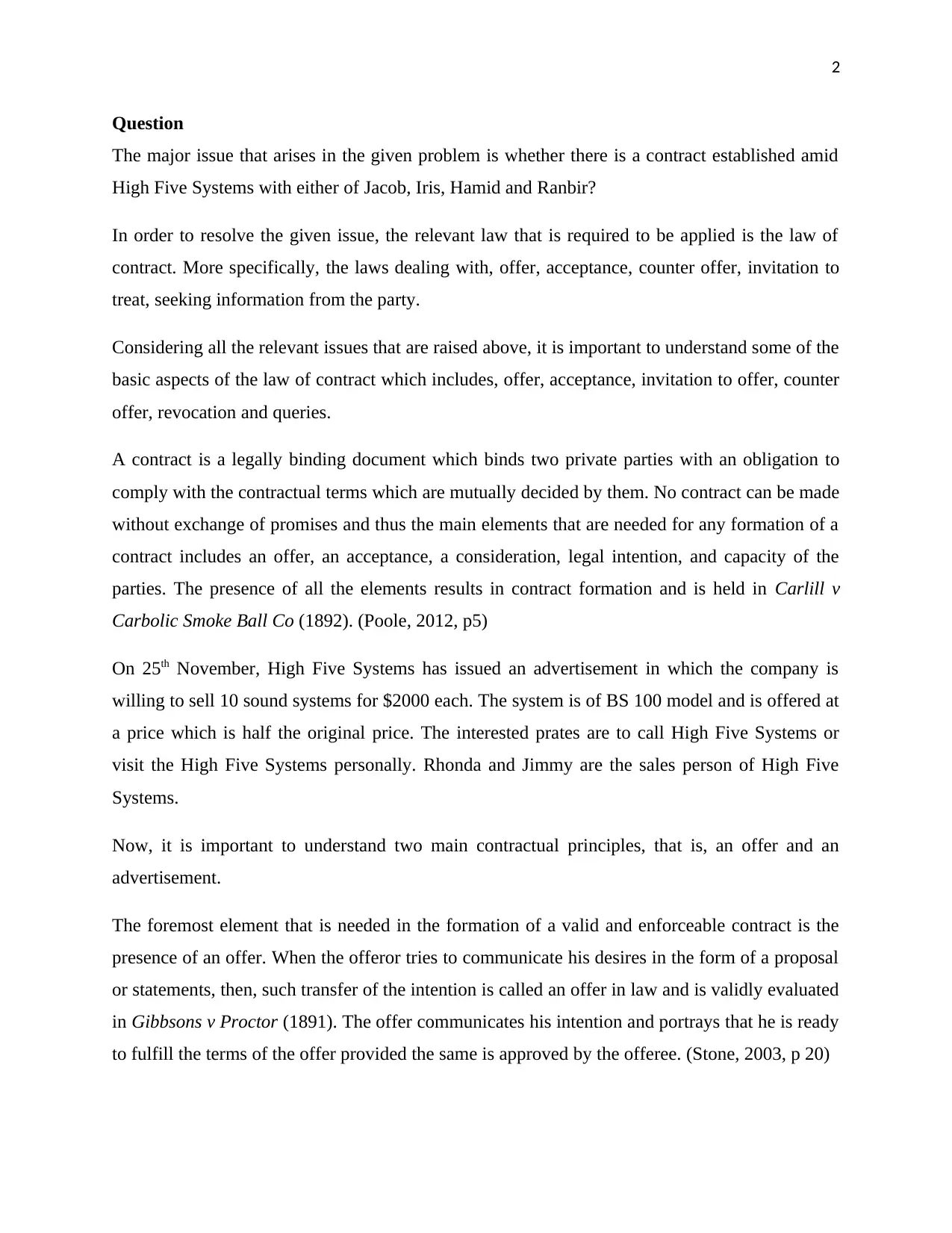
2
Question
The major issue that arises in the given problem is whether there is a contract established amid
High Five Systems with either of Jacob, Iris, Hamid and Ranbir?
In order to resolve the given issue, the relevant law that is required to be applied is the law of
contract. More specifically, the laws dealing with, offer, acceptance, counter offer, invitation to
treat, seeking information from the party.
Considering all the relevant issues that are raised above, it is important to understand some of the
basic aspects of the law of contract which includes, offer, acceptance, invitation to offer, counter
offer, revocation and queries.
A contract is a legally binding document which binds two private parties with an obligation to
comply with the contractual terms which are mutually decided by them. No contract can be made
without exchange of promises and thus the main elements that are needed for any formation of a
contract includes an offer, an acceptance, a consideration, legal intention, and capacity of the
parties. The presence of all the elements results in contract formation and is held in Carlill v
Carbolic Smoke Ball Co (1892). (Poole, 2012, p5)
On 25th November, High Five Systems has issued an advertisement in which the company is
willing to sell 10 sound systems for $2000 each. The system is of BS 100 model and is offered at
a price which is half the original price. The interested prates are to call High Five Systems or
visit the High Five Systems personally. Rhonda and Jimmy are the sales person of High Five
Systems.
Now, it is important to understand two main contractual principles, that is, an offer and an
advertisement.
The foremost element that is needed in the formation of a valid and enforceable contract is the
presence of an offer. When the offeror tries to communicate his desires in the form of a proposal
or statements, then, such transfer of the intention is called an offer in law and is validly evaluated
in Gibbsons v Proctor (1891). The offer communicates his intention and portrays that he is ready
to fulfill the terms of the offer provided the same is approved by the offeree. (Stone, 2003, p 20)
Question
The major issue that arises in the given problem is whether there is a contract established amid
High Five Systems with either of Jacob, Iris, Hamid and Ranbir?
In order to resolve the given issue, the relevant law that is required to be applied is the law of
contract. More specifically, the laws dealing with, offer, acceptance, counter offer, invitation to
treat, seeking information from the party.
Considering all the relevant issues that are raised above, it is important to understand some of the
basic aspects of the law of contract which includes, offer, acceptance, invitation to offer, counter
offer, revocation and queries.
A contract is a legally binding document which binds two private parties with an obligation to
comply with the contractual terms which are mutually decided by them. No contract can be made
without exchange of promises and thus the main elements that are needed for any formation of a
contract includes an offer, an acceptance, a consideration, legal intention, and capacity of the
parties. The presence of all the elements results in contract formation and is held in Carlill v
Carbolic Smoke Ball Co (1892). (Poole, 2012, p5)
On 25th November, High Five Systems has issued an advertisement in which the company is
willing to sell 10 sound systems for $2000 each. The system is of BS 100 model and is offered at
a price which is half the original price. The interested prates are to call High Five Systems or
visit the High Five Systems personally. Rhonda and Jimmy are the sales person of High Five
Systems.
Now, it is important to understand two main contractual principles, that is, an offer and an
advertisement.
The foremost element that is needed in the formation of a valid and enforceable contract is the
presence of an offer. When the offeror tries to communicate his desires in the form of a proposal
or statements, then, such transfer of the intention is called an offer in law and is validly evaluated
in Gibbsons v Proctor (1891). The offer communicates his intention and portrays that he is ready
to fulfill the terms of the offer provided the same is approved by the offeree. (Stone, 2003, p 20)
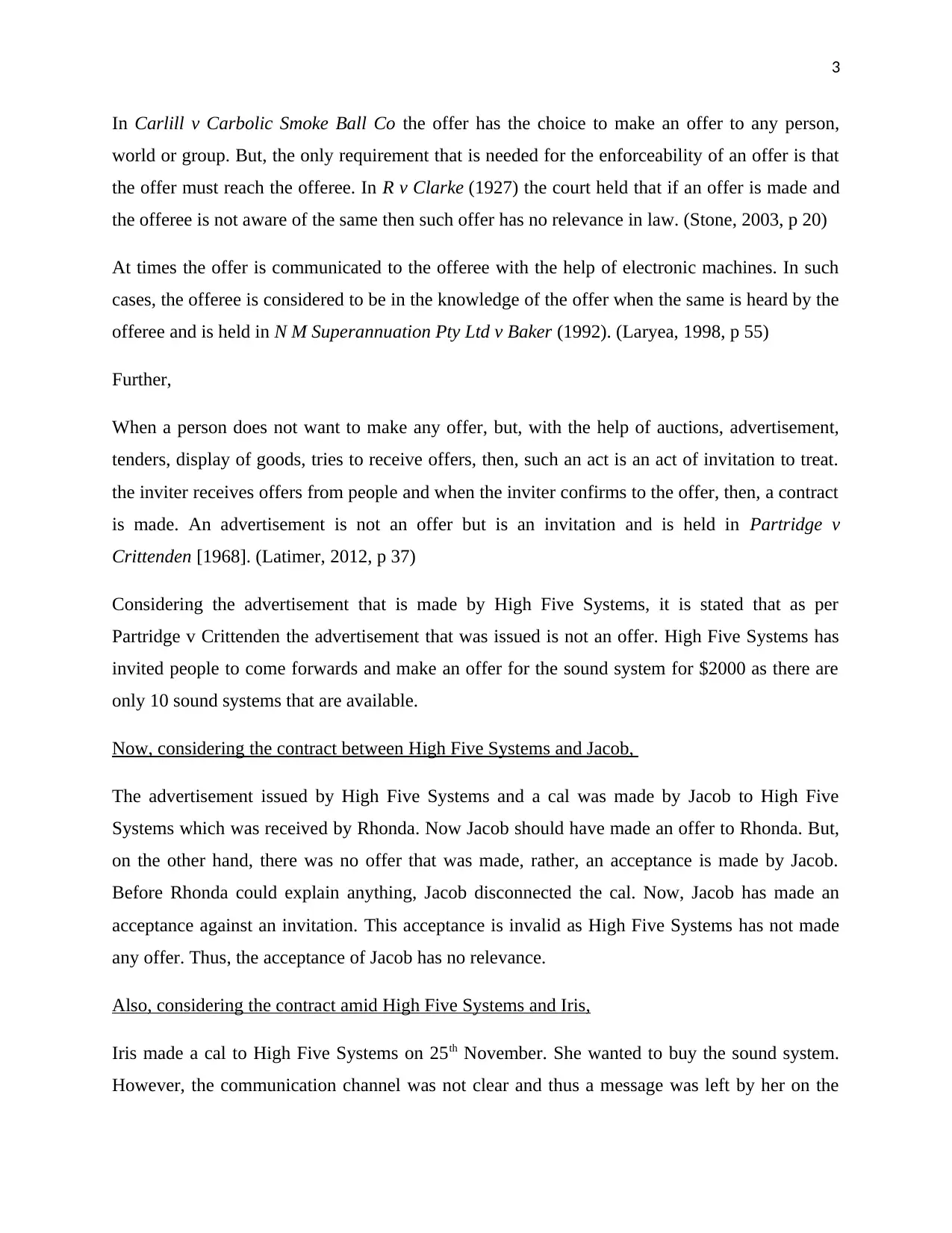
3
In Carlill v Carbolic Smoke Ball Co the offer has the choice to make an offer to any person,
world or group. But, the only requirement that is needed for the enforceability of an offer is that
the offer must reach the offeree. In R v Clarke (1927) the court held that if an offer is made and
the offeree is not aware of the same then such offer has no relevance in law. (Stone, 2003, p 20)
At times the offer is communicated to the offeree with the help of electronic machines. In such
cases, the offeree is considered to be in the knowledge of the offer when the same is heard by the
offeree and is held in N M Superannuation Pty Ltd v Baker (1992). (Laryea, 1998, p 55)
Further,
When a person does not want to make any offer, but, with the help of auctions, advertisement,
tenders, display of goods, tries to receive offers, then, such an act is an act of invitation to treat.
the inviter receives offers from people and when the inviter confirms to the offer, then, a contract
is made. An advertisement is not an offer but is an invitation and is held in Partridge v
Crittenden [1968]. (Latimer, 2012, p 37)
Considering the advertisement that is made by High Five Systems, it is stated that as per
Partridge v Crittenden the advertisement that was issued is not an offer. High Five Systems has
invited people to come forwards and make an offer for the sound system for $2000 as there are
only 10 sound systems that are available.
Now, considering the contract between High Five Systems and Jacob,
The advertisement issued by High Five Systems and a cal was made by Jacob to High Five
Systems which was received by Rhonda. Now Jacob should have made an offer to Rhonda. But,
on the other hand, there was no offer that was made, rather, an acceptance is made by Jacob.
Before Rhonda could explain anything, Jacob disconnected the cal. Now, Jacob has made an
acceptance against an invitation. This acceptance is invalid as High Five Systems has not made
any offer. Thus, the acceptance of Jacob has no relevance.
Also, considering the contract amid High Five Systems and Iris,
Iris made a cal to High Five Systems on 25th November. She wanted to buy the sound system.
However, the communication channel was not clear and thus a message was left by her on the
In Carlill v Carbolic Smoke Ball Co the offer has the choice to make an offer to any person,
world or group. But, the only requirement that is needed for the enforceability of an offer is that
the offer must reach the offeree. In R v Clarke (1927) the court held that if an offer is made and
the offeree is not aware of the same then such offer has no relevance in law. (Stone, 2003, p 20)
At times the offer is communicated to the offeree with the help of electronic machines. In such
cases, the offeree is considered to be in the knowledge of the offer when the same is heard by the
offeree and is held in N M Superannuation Pty Ltd v Baker (1992). (Laryea, 1998, p 55)
Further,
When a person does not want to make any offer, but, with the help of auctions, advertisement,
tenders, display of goods, tries to receive offers, then, such an act is an act of invitation to treat.
the inviter receives offers from people and when the inviter confirms to the offer, then, a contract
is made. An advertisement is not an offer but is an invitation and is held in Partridge v
Crittenden [1968]. (Latimer, 2012, p 37)
Considering the advertisement that is made by High Five Systems, it is stated that as per
Partridge v Crittenden the advertisement that was issued is not an offer. High Five Systems has
invited people to come forwards and make an offer for the sound system for $2000 as there are
only 10 sound systems that are available.
Now, considering the contract between High Five Systems and Jacob,
The advertisement issued by High Five Systems and a cal was made by Jacob to High Five
Systems which was received by Rhonda. Now Jacob should have made an offer to Rhonda. But,
on the other hand, there was no offer that was made, rather, an acceptance is made by Jacob.
Before Rhonda could explain anything, Jacob disconnected the cal. Now, Jacob has made an
acceptance against an invitation. This acceptance is invalid as High Five Systems has not made
any offer. Thus, the acceptance of Jacob has no relevance.
Also, considering the contract amid High Five Systems and Iris,
Iris made a cal to High Five Systems on 25th November. She wanted to buy the sound system.
However, the communication channel was not clear and thus a message was left by her on the
⊘ This is a preview!⊘
Do you want full access?
Subscribe today to unlock all pages.

Trusted by 1+ million students worldwide
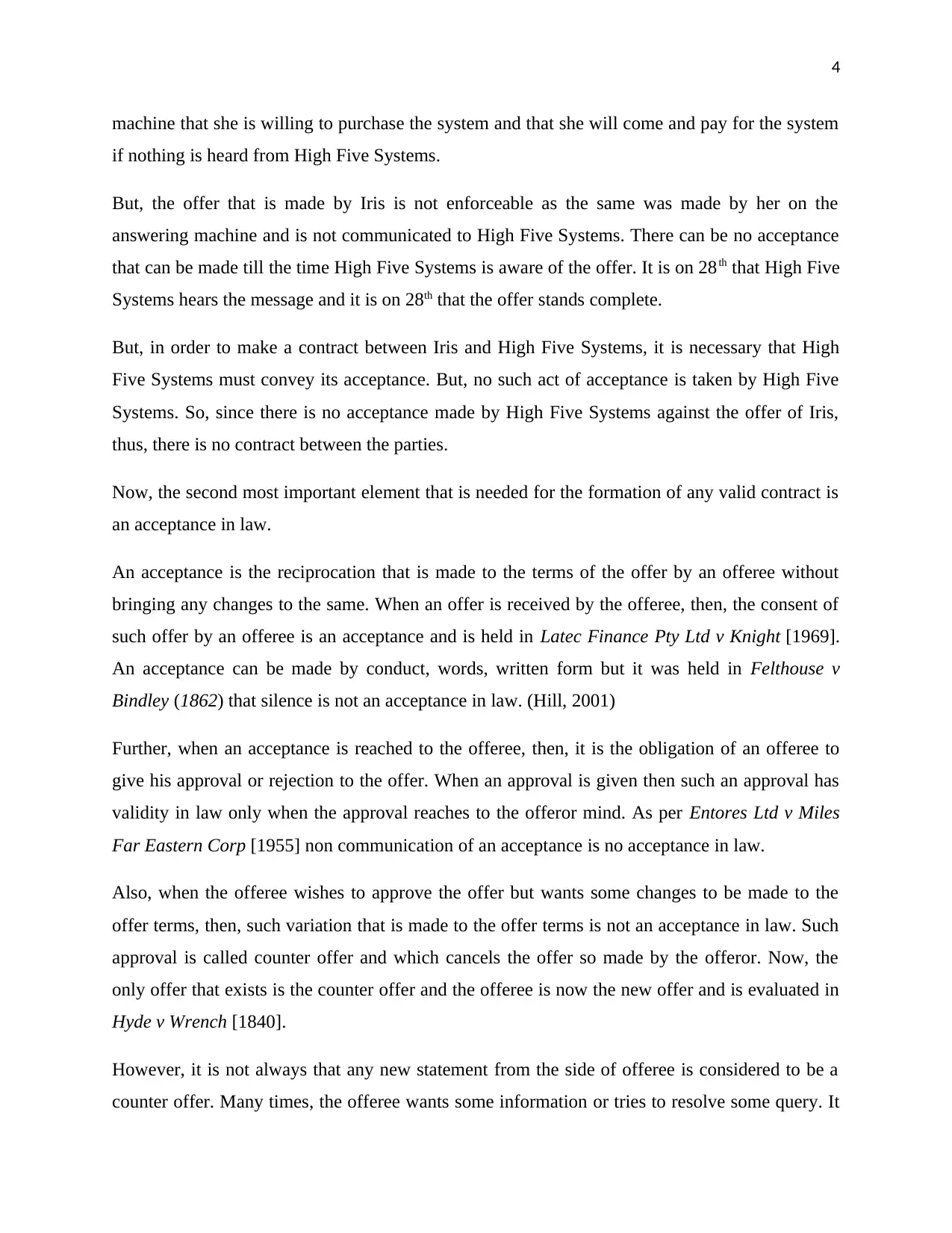
4
machine that she is willing to purchase the system and that she will come and pay for the system
if nothing is heard from High Five Systems.
But, the offer that is made by Iris is not enforceable as the same was made by her on the
answering machine and is not communicated to High Five Systems. There can be no acceptance
that can be made till the time High Five Systems is aware of the offer. It is on 28th that High Five
Systems hears the message and it is on 28th that the offer stands complete.
But, in order to make a contract between Iris and High Five Systems, it is necessary that High
Five Systems must convey its acceptance. But, no such act of acceptance is taken by High Five
Systems. So, since there is no acceptance made by High Five Systems against the offer of Iris,
thus, there is no contract between the parties.
Now, the second most important element that is needed for the formation of any valid contract is
an acceptance in law.
An acceptance is the reciprocation that is made to the terms of the offer by an offeree without
bringing any changes to the same. When an offer is received by the offeree, then, the consent of
such offer by an offeree is an acceptance and is held in Latec Finance Pty Ltd v Knight [1969].
An acceptance can be made by conduct, words, written form but it was held in Felthouse v
Bindley (1862) that silence is not an acceptance in law. (Hill, 2001)
Further, when an acceptance is reached to the offeree, then, it is the obligation of an offeree to
give his approval or rejection to the offer. When an approval is given then such an approval has
validity in law only when the approval reaches to the offeror mind. As per Entores Ltd v Miles
Far Eastern Corp [1955] non communication of an acceptance is no acceptance in law.
Also, when the offeree wishes to approve the offer but wants some changes to be made to the
offer terms, then, such variation that is made to the offer terms is not an acceptance in law. Such
approval is called counter offer and which cancels the offer so made by the offeror. Now, the
only offer that exists is the counter offer and the offeree is now the new offer and is evaluated in
Hyde v Wrench [1840].
However, it is not always that any new statement from the side of offeree is considered to be a
counter offer. Many times, the offeree wants some information or tries to resolve some query. It
machine that she is willing to purchase the system and that she will come and pay for the system
if nothing is heard from High Five Systems.
But, the offer that is made by Iris is not enforceable as the same was made by her on the
answering machine and is not communicated to High Five Systems. There can be no acceptance
that can be made till the time High Five Systems is aware of the offer. It is on 28th that High Five
Systems hears the message and it is on 28th that the offer stands complete.
But, in order to make a contract between Iris and High Five Systems, it is necessary that High
Five Systems must convey its acceptance. But, no such act of acceptance is taken by High Five
Systems. So, since there is no acceptance made by High Five Systems against the offer of Iris,
thus, there is no contract between the parties.
Now, the second most important element that is needed for the formation of any valid contract is
an acceptance in law.
An acceptance is the reciprocation that is made to the terms of the offer by an offeree without
bringing any changes to the same. When an offer is received by the offeree, then, the consent of
such offer by an offeree is an acceptance and is held in Latec Finance Pty Ltd v Knight [1969].
An acceptance can be made by conduct, words, written form but it was held in Felthouse v
Bindley (1862) that silence is not an acceptance in law. (Hill, 2001)
Further, when an acceptance is reached to the offeree, then, it is the obligation of an offeree to
give his approval or rejection to the offer. When an approval is given then such an approval has
validity in law only when the approval reaches to the offeror mind. As per Entores Ltd v Miles
Far Eastern Corp [1955] non communication of an acceptance is no acceptance in law.
Also, when the offeree wishes to approve the offer but wants some changes to be made to the
offer terms, then, such variation that is made to the offer terms is not an acceptance in law. Such
approval is called counter offer and which cancels the offer so made by the offeror. Now, the
only offer that exists is the counter offer and the offeree is now the new offer and is evaluated in
Hyde v Wrench [1840].
However, it is not always that any new statement from the side of offeree is considered to be a
counter offer. Many times, the offeree wants some information or tries to resolve some query. It
Paraphrase This Document
Need a fresh take? Get an instant paraphrase of this document with our AI Paraphraser
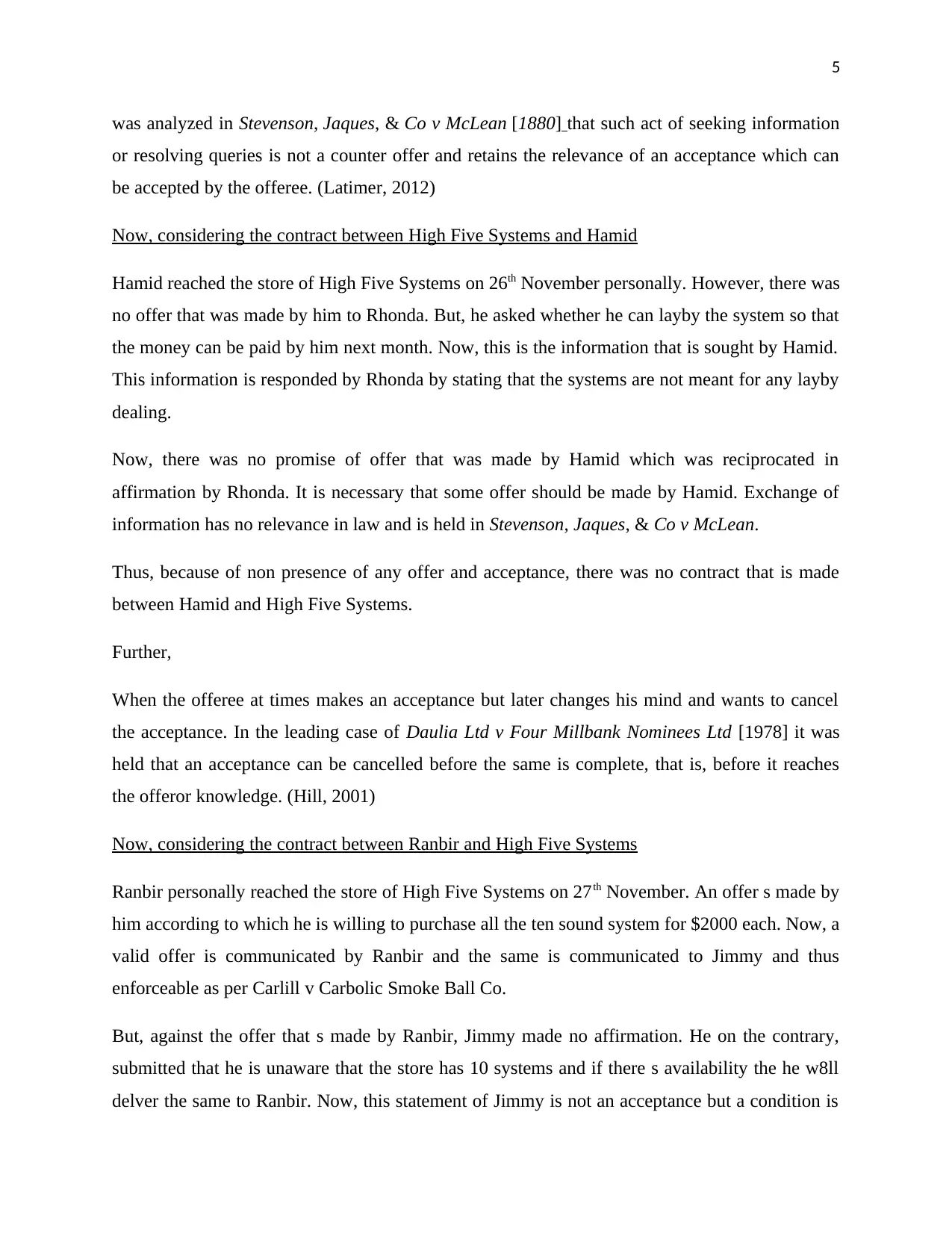
5
was analyzed in Stevenson, Jaques, & Co v McLean [1880] that such act of seeking information
or resolving queries is not a counter offer and retains the relevance of an acceptance which can
be accepted by the offeree. (Latimer, 2012)
Now, considering the contract between High Five Systems and Hamid
Hamid reached the store of High Five Systems on 26th November personally. However, there was
no offer that was made by him to Rhonda. But, he asked whether he can layby the system so that
the money can be paid by him next month. Now, this is the information that is sought by Hamid.
This information is responded by Rhonda by stating that the systems are not meant for any layby
dealing.
Now, there was no promise of offer that was made by Hamid which was reciprocated in
affirmation by Rhonda. It is necessary that some offer should be made by Hamid. Exchange of
information has no relevance in law and is held in Stevenson, Jaques, & Co v McLean.
Thus, because of non presence of any offer and acceptance, there was no contract that is made
between Hamid and High Five Systems.
Further,
When the offeree at times makes an acceptance but later changes his mind and wants to cancel
the acceptance. In the leading case of Daulia Ltd v Four Millbank Nominees Ltd [1978] it was
held that an acceptance can be cancelled before the same is complete, that is, before it reaches
the offeror knowledge. (Hill, 2001)
Now, considering the contract between Ranbir and High Five Systems
Ranbir personally reached the store of High Five Systems on 27th November. An offer s made by
him according to which he is willing to purchase all the ten sound system for $2000 each. Now, a
valid offer is communicated by Ranbir and the same is communicated to Jimmy and thus
enforceable as per Carlill v Carbolic Smoke Ball Co.
But, against the offer that s made by Ranbir, Jimmy made no affirmation. He on the contrary,
submitted that he is unaware that the store has 10 systems and if there s availability the he w8ll
delver the same to Ranbir. Now, this statement of Jimmy is not an acceptance but a condition is
was analyzed in Stevenson, Jaques, & Co v McLean [1880] that such act of seeking information
or resolving queries is not a counter offer and retains the relevance of an acceptance which can
be accepted by the offeree. (Latimer, 2012)
Now, considering the contract between High Five Systems and Hamid
Hamid reached the store of High Five Systems on 26th November personally. However, there was
no offer that was made by him to Rhonda. But, he asked whether he can layby the system so that
the money can be paid by him next month. Now, this is the information that is sought by Hamid.
This information is responded by Rhonda by stating that the systems are not meant for any layby
dealing.
Now, there was no promise of offer that was made by Hamid which was reciprocated in
affirmation by Rhonda. It is necessary that some offer should be made by Hamid. Exchange of
information has no relevance in law and is held in Stevenson, Jaques, & Co v McLean.
Thus, because of non presence of any offer and acceptance, there was no contract that is made
between Hamid and High Five Systems.
Further,
When the offeree at times makes an acceptance but later changes his mind and wants to cancel
the acceptance. In the leading case of Daulia Ltd v Four Millbank Nominees Ltd [1978] it was
held that an acceptance can be cancelled before the same is complete, that is, before it reaches
the offeror knowledge. (Hill, 2001)
Now, considering the contract between Ranbir and High Five Systems
Ranbir personally reached the store of High Five Systems on 27th November. An offer s made by
him according to which he is willing to purchase all the ten sound system for $2000 each. Now, a
valid offer is communicated by Ranbir and the same is communicated to Jimmy and thus
enforceable as per Carlill v Carbolic Smoke Ball Co.
But, against the offer that s made by Ranbir, Jimmy made no affirmation. He on the contrary,
submitted that he is unaware that the store has 10 systems and if there s availability the he w8ll
delver the same to Ranbir. Now, this statement of Jimmy is not an acceptance but a condition is
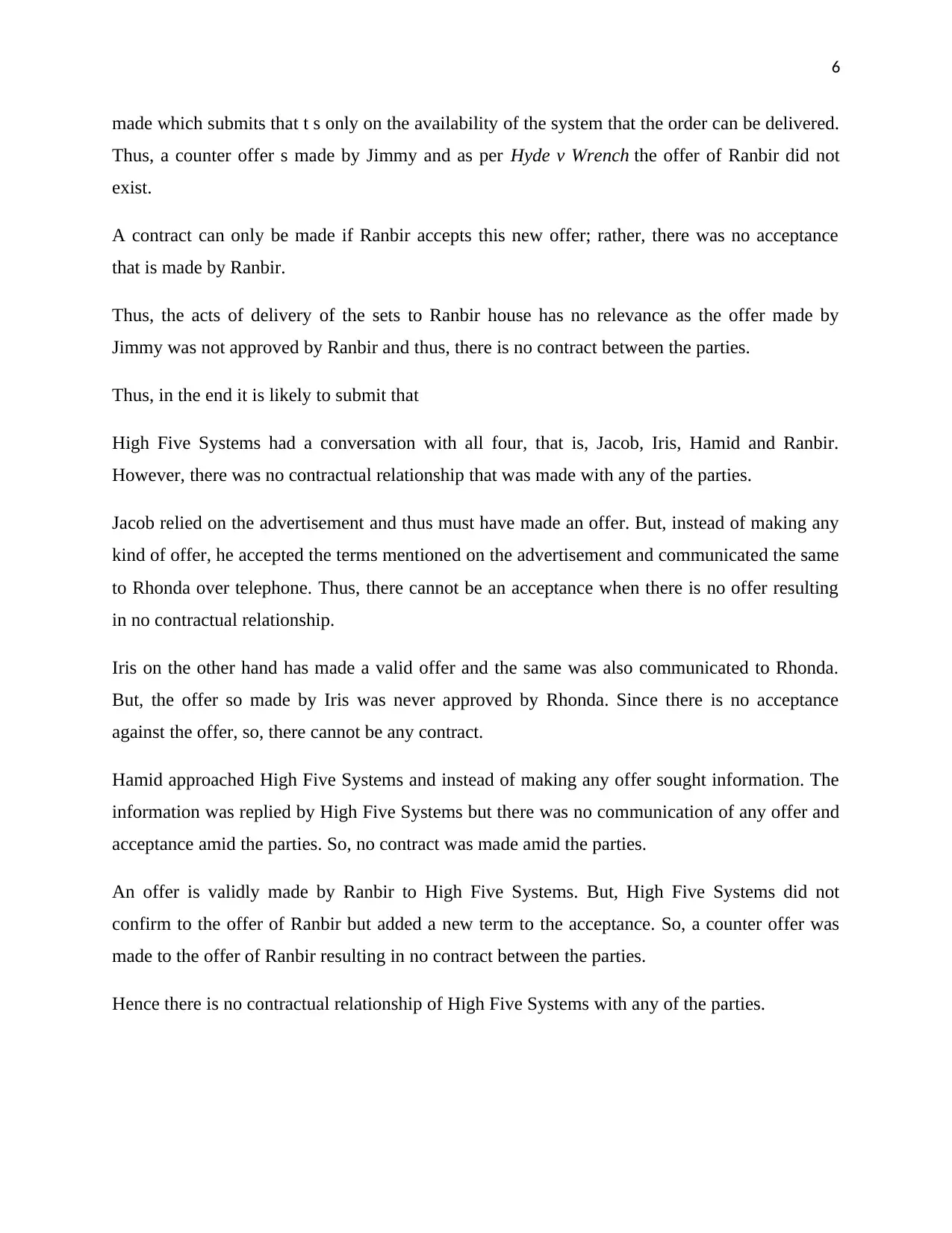
6
made which submits that t s only on the availability of the system that the order can be delivered.
Thus, a counter offer s made by Jimmy and as per Hyde v Wrench the offer of Ranbir did not
exist.
A contract can only be made if Ranbir accepts this new offer; rather, there was no acceptance
that is made by Ranbir.
Thus, the acts of delivery of the sets to Ranbir house has no relevance as the offer made by
Jimmy was not approved by Ranbir and thus, there is no contract between the parties.
Thus, in the end it is likely to submit that
High Five Systems had a conversation with all four, that is, Jacob, Iris, Hamid and Ranbir.
However, there was no contractual relationship that was made with any of the parties.
Jacob relied on the advertisement and thus must have made an offer. But, instead of making any
kind of offer, he accepted the terms mentioned on the advertisement and communicated the same
to Rhonda over telephone. Thus, there cannot be an acceptance when there is no offer resulting
in no contractual relationship.
Iris on the other hand has made a valid offer and the same was also communicated to Rhonda.
But, the offer so made by Iris was never approved by Rhonda. Since there is no acceptance
against the offer, so, there cannot be any contract.
Hamid approached High Five Systems and instead of making any offer sought information. The
information was replied by High Five Systems but there was no communication of any offer and
acceptance amid the parties. So, no contract was made amid the parties.
An offer is validly made by Ranbir to High Five Systems. But, High Five Systems did not
confirm to the offer of Ranbir but added a new term to the acceptance. So, a counter offer was
made to the offer of Ranbir resulting in no contract between the parties.
Hence there is no contractual relationship of High Five Systems with any of the parties.
made which submits that t s only on the availability of the system that the order can be delivered.
Thus, a counter offer s made by Jimmy and as per Hyde v Wrench the offer of Ranbir did not
exist.
A contract can only be made if Ranbir accepts this new offer; rather, there was no acceptance
that is made by Ranbir.
Thus, the acts of delivery of the sets to Ranbir house has no relevance as the offer made by
Jimmy was not approved by Ranbir and thus, there is no contract between the parties.
Thus, in the end it is likely to submit that
High Five Systems had a conversation with all four, that is, Jacob, Iris, Hamid and Ranbir.
However, there was no contractual relationship that was made with any of the parties.
Jacob relied on the advertisement and thus must have made an offer. But, instead of making any
kind of offer, he accepted the terms mentioned on the advertisement and communicated the same
to Rhonda over telephone. Thus, there cannot be an acceptance when there is no offer resulting
in no contractual relationship.
Iris on the other hand has made a valid offer and the same was also communicated to Rhonda.
But, the offer so made by Iris was never approved by Rhonda. Since there is no acceptance
against the offer, so, there cannot be any contract.
Hamid approached High Five Systems and instead of making any offer sought information. The
information was replied by High Five Systems but there was no communication of any offer and
acceptance amid the parties. So, no contract was made amid the parties.
An offer is validly made by Ranbir to High Five Systems. But, High Five Systems did not
confirm to the offer of Ranbir but added a new term to the acceptance. So, a counter offer was
made to the offer of Ranbir resulting in no contract between the parties.
Hence there is no contractual relationship of High Five Systems with any of the parties.
⊘ This is a preview!⊘
Do you want full access?
Subscribe today to unlock all pages.

Trusted by 1+ million students worldwide
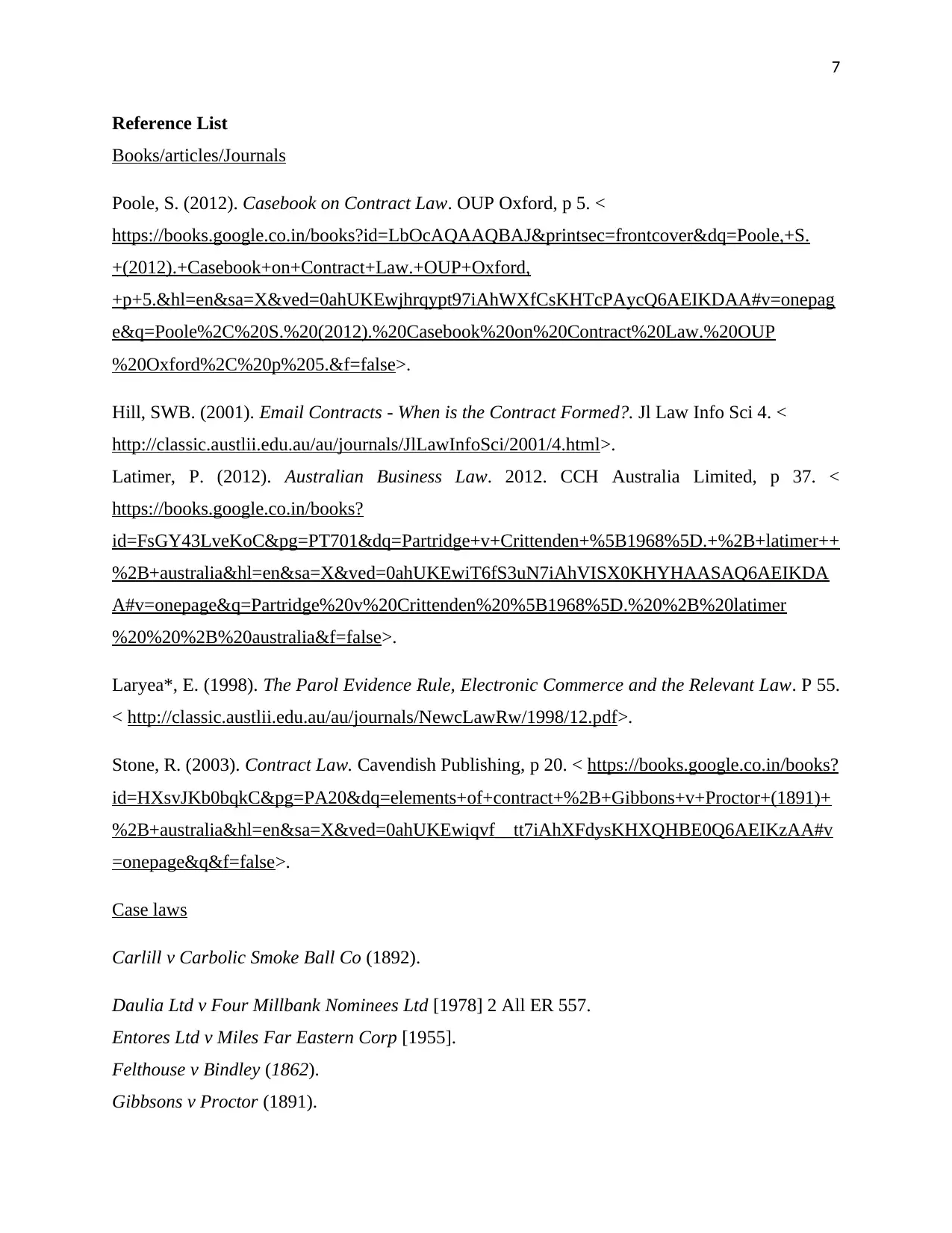
7
Reference List
Books/articles/Journals
Poole, S. (2012). Casebook on Contract Law. OUP Oxford, p 5. <
https://books.google.co.in/books?id=LbOcAQAAQBAJ&printsec=frontcover&dq=Poole,+S.
+(2012).+Casebook+on+Contract+Law.+OUP+Oxford,
+p+5.&hl=en&sa=X&ved=0ahUKEwjhrqypt97iAhWXfCsKHTcPAycQ6AEIKDAA#v=onepag
e&q=Poole%2C%20S.%20(2012).%20Casebook%20on%20Contract%20Law.%20OUP
%20Oxford%2C%20p%205.&f=false>.
Hill, SWB. (2001). Email Contracts - When is the Contract Formed?. Jl Law Info Sci 4. <
http://classic.austlii.edu.au/au/journals/JlLawInfoSci/2001/4.html>.
Latimer, P. (2012). Australian Business Law. 2012. CCH Australia Limited, p 37. <
https://books.google.co.in/books?
id=FsGY43LveKoC&pg=PT701&dq=Partridge+v+Crittenden+%5B1968%5D.+%2B+latimer++
%2B+australia&hl=en&sa=X&ved=0ahUKEwiT6fS3uN7iAhVISX0KHYHAASAQ6AEIKDA
A#v=onepage&q=Partridge%20v%20Crittenden%20%5B1968%5D.%20%2B%20latimer
%20%20%2B%20australia&f=false>.
Laryea*, E. (1998). The Parol Evidence Rule, Electronic Commerce and the Relevant Law. P 55.
< http://classic.austlii.edu.au/au/journals/NewcLawRw/1998/12.pdf>.
Stone, R. (2003). Contract Law. Cavendish Publishing, p 20. < https://books.google.co.in/books?
id=HXsvJKb0bqkC&pg=PA20&dq=elements+of+contract+%2B+Gibbons+v+Proctor+(1891)+
%2B+australia&hl=en&sa=X&ved=0ahUKEwiqvf__tt7iAhXFdysKHXQHBE0Q6AEIKzAA#v
=onepage&q&f=false>.
Case laws
Carlill v Carbolic Smoke Ball Co (1892).
Daulia Ltd v Four Millbank Nominees Ltd [1978] 2 All ER 557.
Entores Ltd v Miles Far Eastern Corp [1955].
Felthouse v Bindley (1862).
Gibbsons v Proctor (1891).
Reference List
Books/articles/Journals
Poole, S. (2012). Casebook on Contract Law. OUP Oxford, p 5. <
https://books.google.co.in/books?id=LbOcAQAAQBAJ&printsec=frontcover&dq=Poole,+S.
+(2012).+Casebook+on+Contract+Law.+OUP+Oxford,
+p+5.&hl=en&sa=X&ved=0ahUKEwjhrqypt97iAhWXfCsKHTcPAycQ6AEIKDAA#v=onepag
e&q=Poole%2C%20S.%20(2012).%20Casebook%20on%20Contract%20Law.%20OUP
%20Oxford%2C%20p%205.&f=false>.
Hill, SWB. (2001). Email Contracts - When is the Contract Formed?. Jl Law Info Sci 4. <
http://classic.austlii.edu.au/au/journals/JlLawInfoSci/2001/4.html>.
Latimer, P. (2012). Australian Business Law. 2012. CCH Australia Limited, p 37. <
https://books.google.co.in/books?
id=FsGY43LveKoC&pg=PT701&dq=Partridge+v+Crittenden+%5B1968%5D.+%2B+latimer++
%2B+australia&hl=en&sa=X&ved=0ahUKEwiT6fS3uN7iAhVISX0KHYHAASAQ6AEIKDA
A#v=onepage&q=Partridge%20v%20Crittenden%20%5B1968%5D.%20%2B%20latimer
%20%20%2B%20australia&f=false>.
Laryea*, E. (1998). The Parol Evidence Rule, Electronic Commerce and the Relevant Law. P 55.
< http://classic.austlii.edu.au/au/journals/NewcLawRw/1998/12.pdf>.
Stone, R. (2003). Contract Law. Cavendish Publishing, p 20. < https://books.google.co.in/books?
id=HXsvJKb0bqkC&pg=PA20&dq=elements+of+contract+%2B+Gibbons+v+Proctor+(1891)+
%2B+australia&hl=en&sa=X&ved=0ahUKEwiqvf__tt7iAhXFdysKHXQHBE0Q6AEIKzAA#v
=onepage&q&f=false>.
Case laws
Carlill v Carbolic Smoke Ball Co (1892).
Daulia Ltd v Four Millbank Nominees Ltd [1978] 2 All ER 557.
Entores Ltd v Miles Far Eastern Corp [1955].
Felthouse v Bindley (1862).
Gibbsons v Proctor (1891).
Paraphrase This Document
Need a fresh take? Get an instant paraphrase of this document with our AI Paraphraser
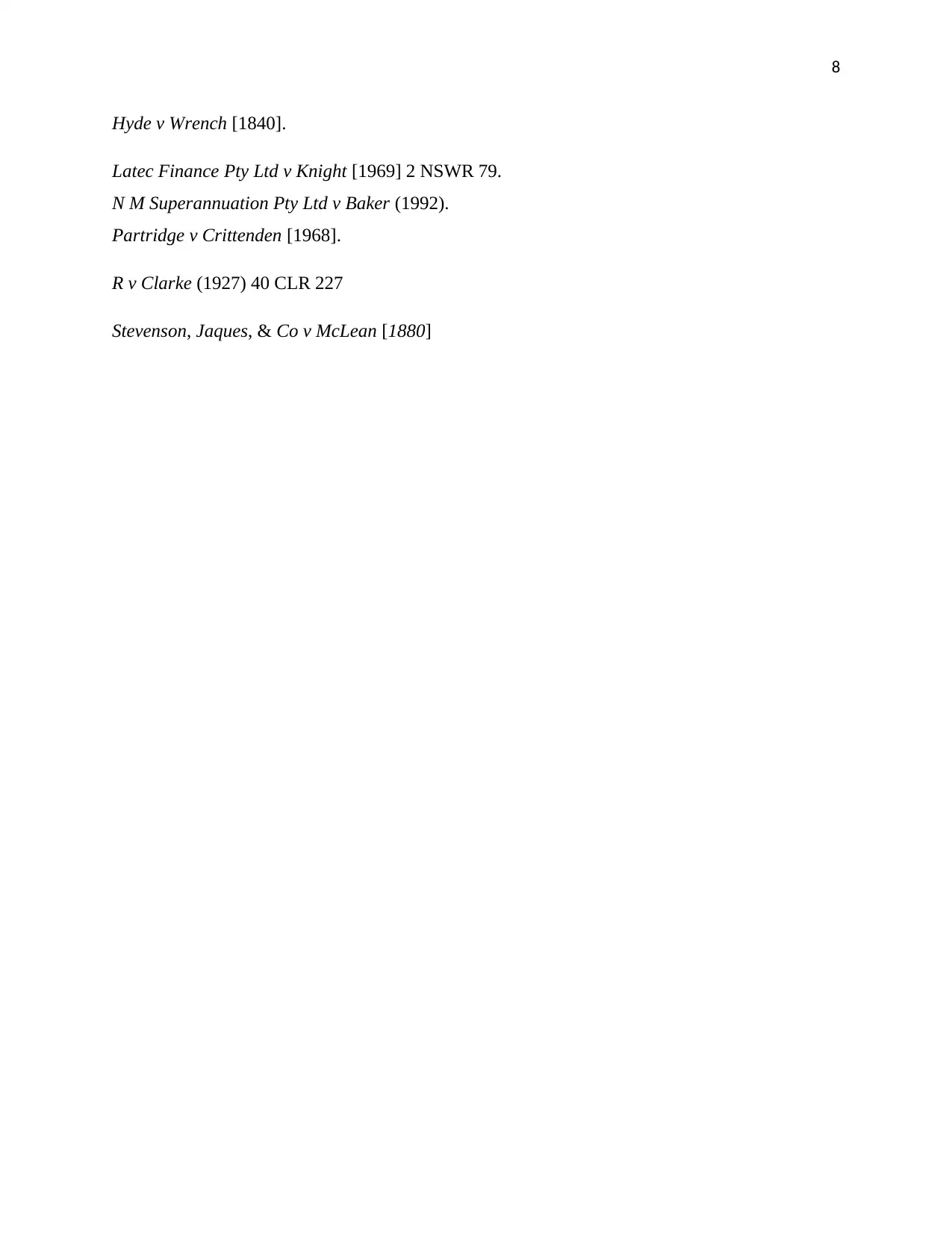
8
Hyde v Wrench [1840].
Latec Finance Pty Ltd v Knight [1969] 2 NSWR 79.
N M Superannuation Pty Ltd v Baker (1992).
Partridge v Crittenden [1968].
R v Clarke (1927) 40 CLR 227
Stevenson, Jaques, & Co v McLean [1880]
Hyde v Wrench [1840].
Latec Finance Pty Ltd v Knight [1969] 2 NSWR 79.
N M Superannuation Pty Ltd v Baker (1992).
Partridge v Crittenden [1968].
R v Clarke (1927) 40 CLR 227
Stevenson, Jaques, & Co v McLean [1880]
1 out of 8
Related Documents
Your All-in-One AI-Powered Toolkit for Academic Success.
+13062052269
info@desklib.com
Available 24*7 on WhatsApp / Email
![[object Object]](/_next/static/media/star-bottom.7253800d.svg)
Unlock your academic potential
Copyright © 2020–2025 A2Z Services. All Rights Reserved. Developed and managed by ZUCOL.




